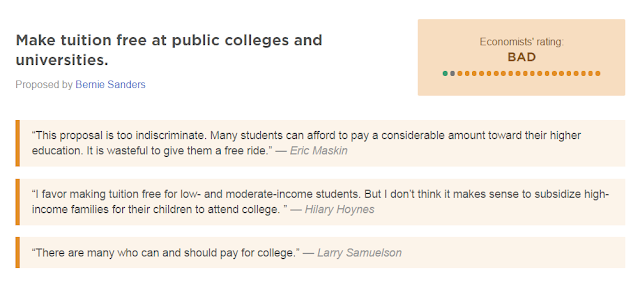Why Free Tuition for All State Universities and Colleges Is Bad for the Philippines
"Free college education is not free", a previous post on this blog, argues why free tuition in state universities and colleges is bad for the Philippines. It is not for the poor. "Poor students are already failing in basic education. It is then very highly unlikely for these students to even apply for college admissions. There are indeed some poor students who are able to beat the odds, and it is a lot more prudent to ensure that these students receive full scholarships and living allowances than to offer free college education to all." There is currently a huge inequity in basic education, which then guarantees that most beneficiaries of free college are not coming from families who most need assistance from the government. In effect, children from wealthy and middle-class families will be able to go to college for free on the back of tax-paying poor families who cannot even afford to have their children finish high school. Worse, to implement this at the tail of a disastrous Deped K to 12 curriculum, which introduces two additional years in high school marked with various tracks aimed at separating those who are college-bound from those who are not, will only magnify the inequity between the poor and the rich in the Philippines.
It is also important to reiterate the other reasons why college education free of tuition is not a good idea:
From a panel of top economists in the United States, more than ninety percent say that state universities and colleges free of tuition is a bad idea.
Unfortunately, legislators in the Philippines do not listen to experts. First, they have destroyed Philippines basic education. Now, they are about to destroy Philippines higher education.
The Commission on Higher Education (CHED) in the Philippines voiced its opinion on this issue when the Philippines Senate began its discussion on providing funds to cover tuition in state universities and colleges. CHED writes:
Given the highly inequitable structure of Philippine society—where opportunities are highly skewed against the poor and the cash strapped lower middle class—we contend that government subsidy for the deserving poor must be higher than for non-poor students... ...Underlying the free tuition proposal is the assumption that SUCs provide access mostly to the disadvantaged poor. The 2014 Annual Poverty Indicator Survey reveals that only 8 out of 100 college age students (17-24 years old) hailed from the poorest or lowest 20% of the population (first and second deciles). On the other hand, 27% of the SUC students belonged to the top 20% of the population (9th and 10th deciles). This situation suggests that a one-size fits all policy of free tuition across all SUCs, might not really benefit the poor....Free tuition will clearly benefit the wealthy and not the poor in the Philippines. Of course, the numbers above do not include yet the damage done by DepEd's K to 12.
It is also important to reiterate the other reasons why college education free of tuition is not a good idea:
Free college education is not free. Similar to basic education, it requires input or resources, which are funded either through taxes or foreign loans. The teaching resources required for higher education are also different from those necessary for elementary and high school education. Teaching in a college or university requires scholarship, after all, higher education means exploring the frontiers of human knowledge. Higher education also differs from basic education because the former values the experience more than the degree it provides. A higher education institution is a community of teachers and scholars. The inputs necessary to support a college or university are therefore vastly different from that of basic education. The highly skilled workforce required to keep an institution of higher education running amounts to substantial costs. There are a few countries in the world that do offer college free of tuition. Ironically, these are also the same countries that have lower percentages of their population with a college degree. Both France and Germany, countries that have free colleges, have lower college-educated adults than the United States, Japan, South Korea, and Canada, countries that do not have free colleges.The biggest problem in higher education in the Philippines is not accessibility, but quality. State universities and colleges in the Philippines badly need funds for their infrastructure, faculty and research. Higher education is not basic education. Providing free college only attracts those who already have the means to pay for college education to take advantage of this benefit. Enrollment in these institutions are therefore only expected to rise without the necessary additions and improvements in infrastructure, faculty and research. These will only further deteriorate the already sad state of higher education in the Philippines.
From a panel of top economists in the United States, more than ninety percent say that state universities and colleges free of tuition is a bad idea.
 |
| Above copied from NPR's Economists On Candidates' Proposals: Mostly Bad |
Unfortunately, legislators in the Philippines do not listen to experts. First, they have destroyed Philippines basic education. Now, they are about to destroy Philippines higher education.
Comments
Post a Comment